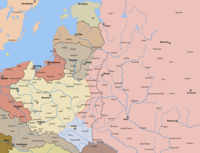
Photo from wikipedia
(1) Background: The war in Ukraine has triggered a huge humanitarian crisis: millions of refugees have escaped from their homes looking for shelter beyond Ukraine’s borders. This emergency offers a… Click to show full abstract
(1) Background: The war in Ukraine has triggered a huge humanitarian crisis: millions of refugees have escaped from their homes looking for shelter beyond Ukraine’s borders. This emergency offers a unique opportunity to investigate and to document those characteristics of the human condition that emerge in exceptional circumstances provoked by war. Based on considerations derived from recent studies on resilience, the research at the base of this paper was conducted to better understand the circumstances, states of mind, and coping mechanisms of the refugees leaving their homes looking for security. (2) Methods: A qualitative approach was applied, resorting to semi-structured interviews (n = 94) to closely explore the traumatic experiences lived by refugees and to identify their coping strategies. (3) Results: The data obtained pointed to a plurality of coping and resilience strategies. Maintaining communication with separated loved ones as well as experiencing accompaniment by helpers and hosts emerged as principal elements for coping and resilience. It was found that a prior development of interior life or practice of prayer served as psychological “capital” that increased their resilience. (4) Conclusion: The results point to the need to care for social networking, attention by hosts, and cultivating interior life as keys for resilience.
Journal Title: International Journal of Environmental Research and Public Health
Year Published: 2022
Link to full text (if available)
Share on Social Media: Sign Up to like & get
recommendations!